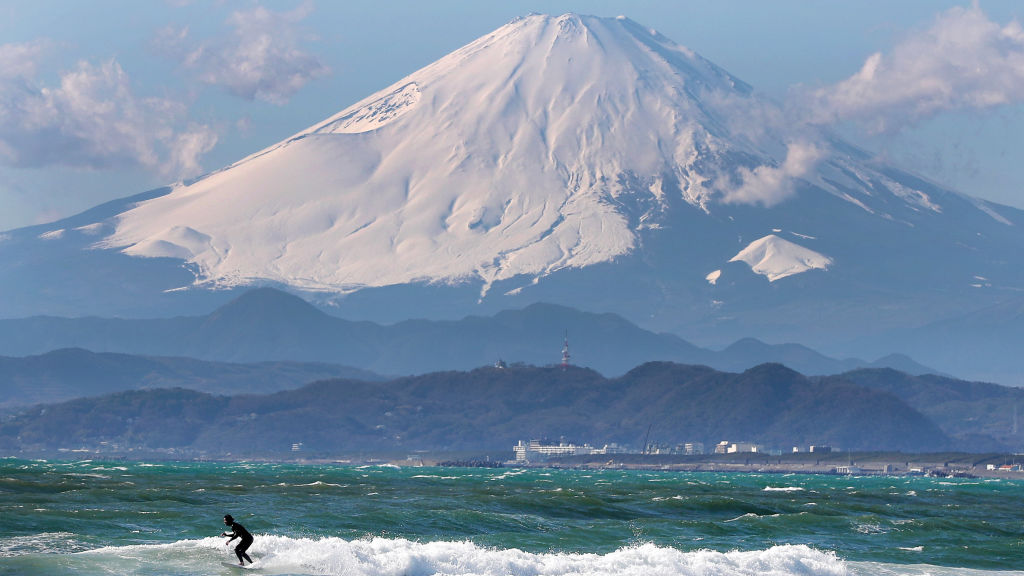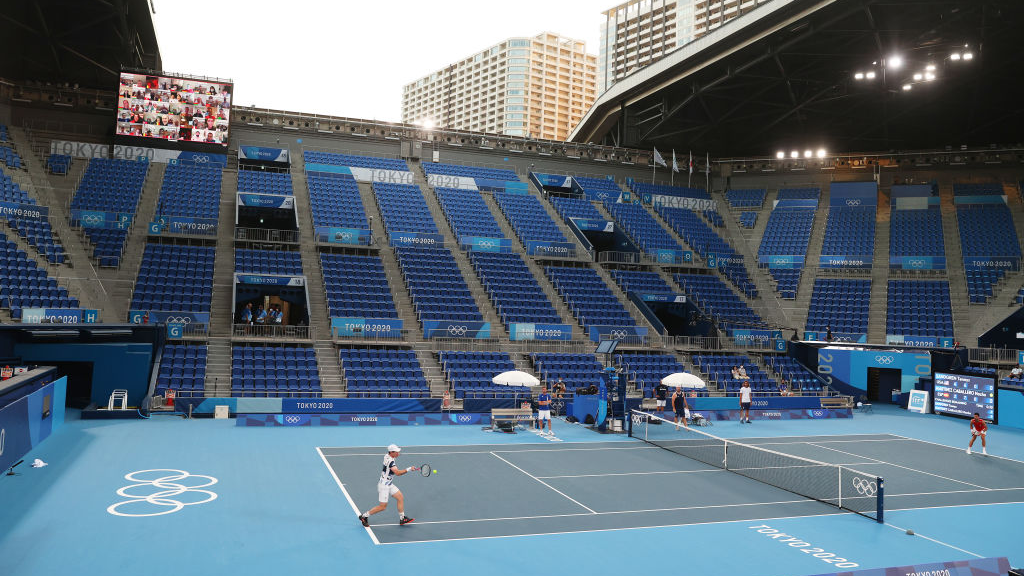
At the foot of Mount Fuji in the background during the build up to the Tokyo 2020 Olympic Games in Fujisawa, Kanagawa Prefecture, Japan, January 30, 2020. /Getty
At the foot of Mount Fuji in the background during the build up to the Tokyo 2020 Olympic Games in Fujisawa, Kanagawa Prefecture, Japan, January 30, 2020. /Getty
Editor's note: Freddie Reidy is a freelance writer based in London. He studied history and history of art at the University of Kent, Canterbury, specializing in Russian history and international politics. The article reflects the author's opinions and not necessarily the views of CGTN.
In 2019, Japan hosted the Rugby World Cup, becoming the first Asian country to host the tournament. The event served as a symbol of recovery and renewal after the 2011 earthquake, with many games played in affected prefectures. The event was also seen as a dress rehearsal for the Tokyo 2020 Olympic Games.
With the opening ceremony due to take place on July 23, the collective national sense of optimism and recovery present at the World Cup has long since evaporated, with Japan in a state of emergency.
Aside from the pandemic necessitating the Games be moved to 2021, it has also been dogged by a succession of highly publicised scandals.
Tokyo Olympic Games president Yoshiro Mori was forced to quit his position after making sexist remarks. Just days ahead of the opening ceremony, another scandal struck with alterations to the opening ceremony required after its lead composer was forced to resign amid bullying accusations. This was followed by the dismissal of Kentaro Kobayashi, director of the opening ceremony, after historic footage emerged of him making jokes about the Holocaust.
In addition to the individual scandals attracting international headlines, public sentiment in Japan has proved resistant to hosting the Games amid the pandemic. Protests calling for a cancellation have gathered momentum in recent months.
Such is the level of concern with the Games becoming a "super-spreader" event that Emperor Naruhito took the extremely rare step of issuing a statement via Yasuhiko Nishimura, grand steward of the Imperial Household agency. Nishimura stated that "the emperor is extremely worried about the current status of coronavirus infections" and that "given the public's worries, he appears to be concerned about whether the event would cause infections to spread. "

Andy Murray of Team Great Britain plays during a practice match against Novak Djokovic of Team Serbia ahead of the Tokyo 2020 Olympic Games at Ariake Tennis Park in Tokyo, Japan, July 22, 2021. /Getty
Andy Murray of Team Great Britain plays during a practice match against Novak Djokovic of Team Serbia ahead of the Tokyo 2020 Olympic Games at Ariake Tennis Park in Tokyo, Japan, July 22, 2021. /Getty
The concern and animosity have also contributed to commercial fears from Olympic sponsors in Japan who are worried for their company's reputation being associated with an imperilled event.
On Monday it was reported that Toyota, a global sponsor of the Games, would not run advertisements in Japan associating the conglomerate with Tokyo 2020 – a damning indictment from one of the country's leading and best-known companies.
However, it is difficult to argue with the logic of such moves. First it was announced that foreign spectators would not be permitted to enter the country. This was then followed by the declaration of a state of emergency, with Tokyo residents also prohibited from attending events.
With the official opening of the Games looming upon the host nation, it has been reported that Tokyo cases have risen to 1,832 per day, with a 40-percent rise forecast in the next two weeks.
Toshio Nakagawa, leader of the Japan Medical Association, told press officials that: "The surge in cases has been expected whether we have the Olympics or not. But what we have worried about is now actually happening."
IOC chairman Thomas Bach had grandly declared in a bid to allay the concerns of the Japanese people that there was "zero chance" an outbreak could get into the general population from the Olympic village. His claim was panned as overconfident. Bach's words were swiftly followed by the first COVID-19 cases being announced within the athletes' village.
Indeed, COVID-19 infections have already led to mandatory isolation measures and the withdrawal of some competitors. Many athletes have also elected to skip Tokyo 2020 altogether over fears of contracting the virus.
However, despite these challenges and with every effort being taken to isolate athletes, perhaps it is symbolically important to persevere with the Games.
For many athletes, Tokyo 2020 will mark the pinnacle of their professional careers, and with or without spectators, the opportunity to represent their country on the world stage is everything.
The Games also represent a coming together of nations in a collective cause, a celebration of determination, teamwork and perseverance against the odds.
That same unity is required to fight COVID-19 and other future challenges like climate change. The solidarity that the Olympic spirit embodies serves as a powerful symbol at a time the world needs it the most.
(If you want to contribute and have specific expertise, please contact us at opinions@cgtn.com.)

